Speech by His Excellency Emomali Rahmon, President of Tajikistan at the Budapest Water Summit 2016
 Your Excellency President Ader,
Your Excellency President Ader,
Distinguished Heads and Members of Delegation,
Honorable Participants,
At the outset I would like to extend my gratitude to the Hungarian side for inviting and ensuring a favorable environment to host this Summit.
We consider the Budapest Water Summit as an excellent opportunity to constructively discuss the topical aspects of water issues at the contemporary world. I believe that it will be another important input in joining our collective efforts to achieve water related SDGs.
This meeting is taking place in a period, when the world community is summarizing the first year of the two globally important documents – 2030 Agenda for Sustainable Development and the Paris Agreement on Climate Change.
It is obvious that it is still early to say about any concrete outcome of this process.
Meanwhile, it is well-known that the water issues are of particular importance in the two earlier-mentioned documents and we have an opportunity to discuss the ways and mechanisms of achievement of goals and objectives set out in those documents.
Currently, the new Global Development Agenda includes the topical issues such as improvement of drinking water quality, effective use of water resources, introduction of their integrated management, protection of water ecosystem and other water related issues. This is an important outcome of joint efforts of the world community over the last several years.
There is no doubt that due to the growing number of the world’s population and decreasing water resources under influence of global climatic changes the threat of water crises will have growing trend.
There is a presumption that almost two billion of the world’s population will face the problem of absolute lack of water by the end of the current decade.
Within the ever-increasing global demand in water constructive cooperation and partnership is the requirement of the day.
Distinguished Participants of the Summit,
As you are aware, the Republic of Tajikistan has been actively promoting water issues in the global agenda during the last two decades.
By the initiative of Tajikistan and a number of other countries the UNGA launched International Year of Fresh Water (2003), International Decade of Action “Water for Life” (2005-2015) and the International Year of Water Cooperation (2013).
These global events made a decent contribution in deeper understanding of water importance both for socio-economic growth and environmental sustainability as well as ensuring peace, stability and development. We are intended to further continue our efforts in this aspect with a view to enhancing progress and achieving new outcomes.
In this context we proposed to launch International Decade of Action “Water for Sustainable Development”. In our opinion, this initiative will create a good platform to achieve SDGs on water by promoting the strengthening of the role of water in achievement of internationally agreed goals and objectives. The process of consideration of the relevant UNGA draft resolution is about to be finalized and we hope that it will be adopted by consensus by the end of this year.
Tajikistan jointly with the UN and other partners hosted a High Level Symposium on “The SDG 6 and Targets: Ensuring that no one is left behind in access to water and sanitation” this year in August. The results of this Symposium are reflected in the Dushanbe Call for Action, which was disseminated as a document of the UNGA 71st Session.
Tajikistan has been promoting water issues also within the High Level Panel on Water established by the UN Secretary-General and the President of the World Bank. The Panel adopted its Plan of Action in September of this year, which in our opinion can be considered as one of the important guiding documents to address water issues at all levels.
Tajikistan has huge water resources that are accumulate in numerous glaciers, rivers, lakes and underground water systems. About 60% of Central Asia’s water resources take their sources within our country.
The Government of Tajikistan has been making intensive efforts to address water issues. We channeled about 1.7bn US dollars into this vitally important sector over the last ten years. However, despite these efforts, our country still faces challenges in various water subsectors. Such a situation is first and foremost associated with the outdated infrastructure, limited financial resources and insufficient technical capacity.
We improved water supply conditions for over 1.5m people in the last decade. However, a part of our population, particularly in rural areas is still in need for improved sanitation and access to safe drinking water sources.
Tajikistan, despite of having huge hydropower resources, still continues facing with power deficit during winter, which leads to various socio-economic consequences.
Tajikistan uses only three to four percent of its total annual capacity amounting 527bn kw/h of electricity.
This proves the availability of abundant opportunity to address existing socio-economic challenges and achieve sustainable development.
Irrigated land management is an important component to ensure food security and public employment. This sector particularly ensures production of more than 80% of the agricultural products comprising 20% of GDP in Tajikistan. However, its existing state does not meet the time-being requirements. We need huge financial resources and relevant efforts to modernize irrigated land management infrastructure.
The processes of climate change and natural disasters also significantly complicate the water problems.
The areas and volume of glaciers and snowfields, which are the main sources of our rivers, reduced significantly over the last decades.
The climate change and difficult mountainous relief are the causes of natural disasters, among which mudslides and flood occur more frequently. They cause huge loss to our economy annually by destroying infrastructure and flooding large areas.
Only the abnormal heat wave in summer of 2015 and rapid melting of glaciers and snowfields caused 600 mln U.S. dollars of loss to our economy.
Such a situation requires undertaking relevant measures on protection of water sources of the country and adaptation of existing water use schemes to these changes.
The Government of Tajikistan continuously focuses on the issues of effective use of water resources, water loss reduction, water quality improvement and reduction of water resources pollution.
To that end, the Water Sector Reform Program (2016-2025) approved by the Government in December of the last year includes a comprehensive and integrated approach, which can serve as the core principle to achieve success in this area.
This Program is based on two main principles: clarification of policy and operation functions and transition to river basin principles of management.
Introduction of integrated water resources management (IWRM) and other objectives included in the SDGs on water are also incorporated in the 2030 National Development Strategy of Tajikistan.
I have also to outline about the dedicated efforts made by the Government of Tajikistan on improvement of water cooperation.
It is obvious that without comprehensive cooperation it is impossible to address water challenges, particularly at the transboundary level.
We stated about our firm approach to difficult water and energy issues of our region for several times by emphasizing that cooperation would be the only reasonable way for their solution.
For this very reason Tajikistan’s Foreign Policy Concept pays a particular attention to the water diplomacy issues.
Central Asian region has already been feeling the negative consequences of the climate change impact. We have more often been observing heavy precipitation or drought years, heat waves in summer and longer frost in winter.
As a result of these natural abnormalities the region’s countries experience huge economic losses and it is obvious that this trend will further continue.
Moreover, there are presumptions that the region’s population will significantly grow in the following years.
This situation in its turn urges for additional incentive for economic growth, including increased production of food and power.
It is obvious that in such situations we will need large-scale capital investments into new infrastructure as well as introduction of new water and energy saving technologies and effective use of existing natural resources to ensure supply of water, energy and food.
It is worth mentioning that water resources as renewable sources of power generation are of particular importance in the process of ensuring the concept of green development, which foresees gradual deviation from dependence on hydrocarbon resources.
Tajikistan’s huge water resources and its substantive mountain mass provide a great opportunity for production of environmentally clean power through which the country will contribute in implementation of this concept.
Mutually rewarding cooperation and coordinated efforts on sound development of hydropower resources would definitely promote achievement of SDGs not only on water, but also on other goals and objectives.
Distinguished Participants of the Summit,
2030 Development Agenda and other International Programs and Agreements on natural resources development, financing and management create a solid basis for further actions.
Integrated water resources management and other effective approaches, initiatives and efforts of the world community promote positive trends in achievement of internationally agreed objectives on water and sanitation.
However, we need to understand that our countries still experience serious challenges in these issues, solution to which requires collective and conformed actions.
In this regard, we need first and foremost to develop the mechanisms of implementation of agreed goals and objectives, which would ensure equal access and opportunity for all categories of water users to meet their demand in water. We definitely need to have guaranteed financial resources for this.
Herewith it is also important to strengthen our efforts and undertake immediate actions to help the most vulnerable segments of population in least developed and developing countries.
It is my sincere hope that our joint efforts in this area would result in another important step towards achievement of SDGs.
At the conclusion I would like to wish everybody fruitful deliberations.
Thank you for your attention.











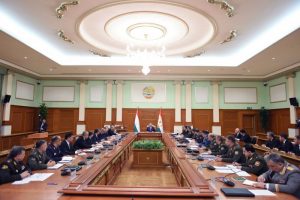 President Emomali Rahmon Holds Security Council meeting
President Emomali Rahmon Holds Security Council meeting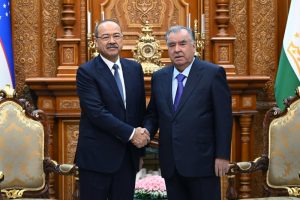 President Emomali Rahmon Receives the Prime Minister of the Republic of Uzbekistan Abdulla Aripov
President Emomali Rahmon Receives the Prime Minister of the Republic of Uzbekistan Abdulla Aripov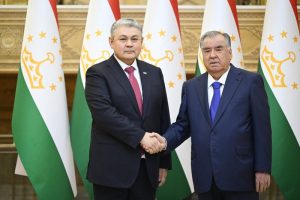 President Emomali Rahmon, Received the Minister of Foreign Affairs of the Republic of Kazakhstan
President Emomali Rahmon, Received the Minister of Foreign Affairs of the Republic of Kazakhstan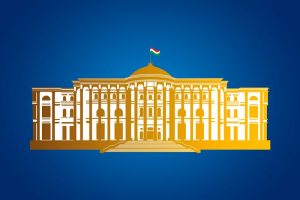 President Emomali Rahmon Enacts New Laws
President Emomali Rahmon Enacts New Laws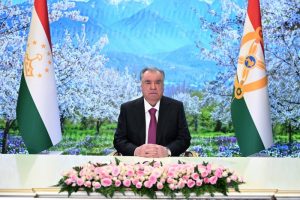 President Emomali Rahmon Sends Festive Greetings to President Xi for Chinese New Year
President Emomali Rahmon Sends Festive Greetings to President Xi for Chinese New Year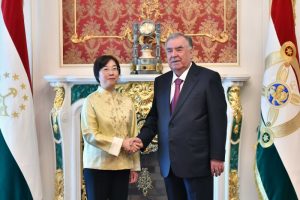 President Emomali Rahmon Receives AIIB President Zou Jiayi in Dushanbe
President Emomali Rahmon Receives AIIB President Zou Jiayi in Dushanbe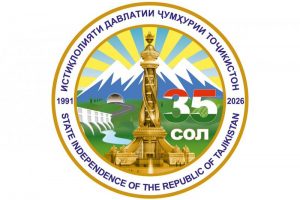 President Emomali Rahmon Approves Emblem for the 35th Anniversary of Tajikistan’s State Independence
President Emomali Rahmon Approves Emblem for the 35th Anniversary of Tajikistan’s State Independence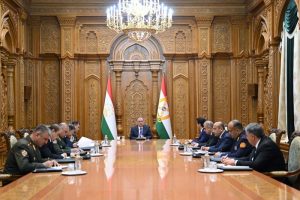 President Emomali Rahmon Holds Working Meeting with Heads of Security and Law Enforcement Agencies
President Emomali Rahmon Holds Working Meeting with Heads of Security and Law Enforcement Agencies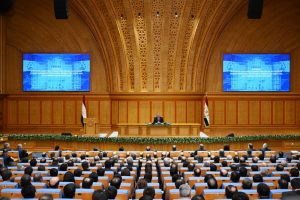 Expanded meeting of the Government of the Republic of Tajikistan
Expanded meeting of the Government of the Republic of Tajikistan














